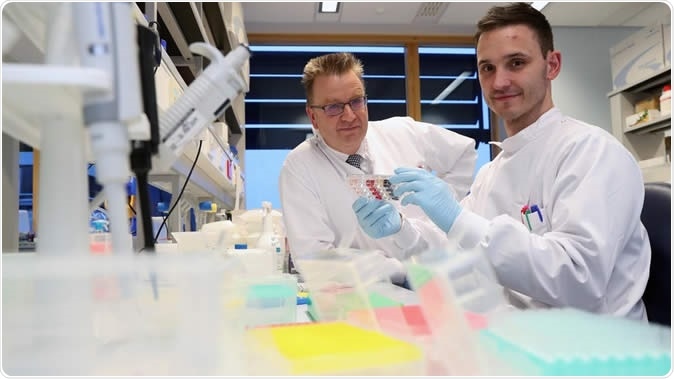The immune system is the body’s defense against harmful pathogens that may enter the body. Immune cells, such as white blood cells and macrophages work hand in hand to fight off disease-causing microorganisms, including cancer.

Professor Andrew Sewell with Research Fellow Garry Dolton
A team of scientists at Cardiff University may have discovered a new type of immune cell can kill most cancers, which may be dubbed as a major breakthrough in treating potentially-fatal cancers. The discovery was previously believed to be impossible, but thanks to an accidental discovery in the laboratory, the researchers found a new type of T-cell that can potentially combat cancer. The study is published in the journal Nature Immunotherapy.
New killer T-cell discovery could open up cancer treatment to all
What they found
Since the body’s immune system targets foreign bodies, it also fight cancer cells. Immunotherapy is used to target cancer cells, but in some instances, they only for some types. It’s usually made of white blood cells and some organs and tissues from the lymph system.
For years, doctors used a treatment dubbed as CAR-T therapy, which involves getting the patient’s own immune cells and genetically modifying them. In this method, the T cells are then returned to the body where they start to hunt and kill cancer cells.
However, this treatment only targets some types of cancer cells, such as bone marrow and blood cancers, but was not effective for solid tumors, which account for a majority of cancer cases.
Since the scope of efficacy is limited, scientists are looking for other ways the immune system naturally attacks tumors, hoping to find something that can kill multiple cancer cells all at once.
T-cell receptor (TCR) and cancer cells
The novel T-cell is believed to have the ability to distinguish cancer cells from healthy ones. It carries a never-before-seen receptor that latches on to most human cancers while ignoring healthy cells in the body.
The surface molecule, MR1, where the new T-cell attaches to, is also found in almost all cells in the body. But they may present differently on cancer cells, permitting a single TCR to be able to effectively target many types of tumors. In laboratory studies, the researchers found that the immune cell equipped with the new receptor was revealed to kill skin, lung, colon, blood, bone, breast, kidney, ovarian, prostate, and cervical cancer.
“The development of a ‘one size fits all’ type of immunotherapy, which could target different types of cancer cells and does not need to be manufactured for each individual patient, is an exciting prospect. This research represents a new way of targeting cancer cells that is really quite exciting, although much more research is needed to understand precisely how it works. It is still early days and we are a while off from confirming whether this approach will definitely work in patients,” Dr. Alasdair Rankin, Director of Research and Policy at the blood cancer charity Bloodwise, said.
Novel treatments
The researchers believe that the new breakthrough could pave the way for the formulation of new and effective therapy to combat cancer. Though the discovery is still young, it serves as a stepping stone for other researchers to build on the new approach to study it further and start on both animal and human studies.
“So far, the power of these immune cells to kill cancer cells has been tested in a lab dish and in mice. At the moment, this is very basic research and not close to actual medicines for patients. But in the long term, the hope is that this type of immune cell could be the basis of new immune therapies, either by infusing these cells directly into patients or by unleashing their capacity to act. There is no question that is a very exciting discovery, both for advancing our basic knowledge about the immune system and for the possibility of future new medicines,” Prof Daniel Davis, Professor of Immunology, University of Manchester, who was not involved in the study, said.
Journal reference:
Crowther, M.D., Dolton, G., Legut, M. et al. Genome-wide CRISPR–Cas9 screening reveals ubiquitous T cell cancer targeting via the monomorphic MHC class I-related protein MR1. Nat Immunol (2020) doi:10.1038/s41590-019-0578-8, https://www.nature.com/articles/s41590-019-0578-8